Life Lessons
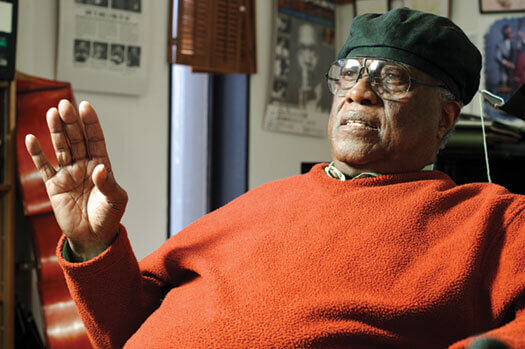
Professor Richard Davis, now in his fourth decade on the UW faculty, teaches his students that the why of a piece of music — its historical context — is every bit as important as its individual notes.
When Richard Davis teaches, his words are like the notes he plays, flowing effortlessly from topic to topic, as he explains music and so much more.
It’s exam day in Professor Richard Davis’s class, Music 311: Black Music (1920–Present): The Saxophone. His students are cramming last-minute looks at their notes, giggling over an inside joke from the previous night’s study group. The room hushes as Davis removes the binder clip from the stack of exams and passes them around. A cassette tape is popped into the player, and they are off.
Sudden smiles brighten the dreary, windowless room in the Mosse Humanities Building — the students nod and grin because they recognize the first selection they are to identify: Coleman Hawkins, tenor saxophone, “Body and Soul.”
Davis chats as they write, giving hints to answers when they are stumped. He hams it up to some lovey-dovey lyrics being played, swaying and chair dancing without inhibition. He plays air bass. Did someone say tension? Not here.
Even on exam days, Davis’s classes have a laid-back, improvisational feel. Rather than lecture from a script, he opens his lesson binder and then ignores it. He starts talking and then veers off into unexpected directions, with new ideas, tempos, and moods, ultimately returning to his beginning idea. Stops and starts, questions, and observations are part of the flow. His classes are musical conversations, not lectures.
That his teaching style might feel improvised is no surprise. He is, after all, a world-famous jazz bassist who has played with many of the greats. When he lectures on jazz history, he seldom needs notes; he speaks with the voice of experience.
But for Davis, it’s not just about the music and being able to identify the artists and their styles. He wants his students to learn the why behind the music. He puts the music into historical and human perspective, describing the reality and consequences of racism. About this, too, he speaks with firsthand knowledge. He shares his life lessons about growing up in a racially divided Chicago to teach about racial injustice, boundaries, black pride, and culture, and how these elements were responsible for the birth of a new style of American music.
Davis’ students learn that Charlie Parker’s “Now’s the Time” is more than a seminal composition in jazz history. It is an emblem of black empowerment and pride, and it has a call to action hidden within the title.
“Charlie Parker was our Beethoven, Brahms, Mozart. It was our music. Parker didn’t just change the saxophone. He changed how we look at music,” says Davis. “Jazz has a classical period, too, and it began before white people starting playing it.”
Answering the Call
In 1977, Davis was at the top of his musical game, with spots on the stages of New York’s best-known clubs and orchestra halls. The Downbeat International Critics Poll named him best bassist eight years in a row (1967–1974). His reputation was such that he was usually the first to be called when a producer, conductor, or composer needed a bass player.
He recorded with a who’s who from pop, jazz, and classical realms: Sarah Vaughan, Eric Dolphy, Frank Sinatra, Barbra Streisand, Miles Davis, George Szell, Leopold Stokowski, Igor Stravinsky, Pierre Boulez, Gunther Schuller, Leonard Bernstein, Quincy Jones, Van Morrison, Laura Nyro, and Bruce Springsteen. (And that’s just for starters.)
Why, then, would Davis give up his life as a successful performing musician for the unglamorous (and often frustrating) world of academia? His answer reveals volumes about the man and his motivations.
“I got a call offering me a job at the university in Madison because they didn’t have a bass teacher on campus. I said, ‘Where’s Madison?’ I asked around if anyone had heard of the place because this school kept calling me,” Davis laughs. “Martin Luther King, Jr. talked about the importance of teaching others, and I had always wanted to teach young people. I thought maybe it was time.”
His talent, reputation, and versatility got him the offer. Letters of recommendation from Stravinsky and Bernstein closed the deal.
And for the past thirty-four years, Davis has been teaching young people music and much more. He has helped student bass players become better, thinking musicians (and many are now also music educators). He has taught many more students about the interconnectedness of jazz and black music, and the damage that racial conditioning has done to us all. He approaches his students with knowledge, as well as compassion and an open heart.
“I love teaching,” Davis says. “One minute they don’t know anything — and then they do. I believe you should share what you have.”
That is not to say he is a pushover. Far from it. He doesn’t tolerate nonsense from students who are not prepared. Those who have made him really unhappy are invited to attend his “Five a.m. Social Club.” An early riser, Davis has students call him at home at that time to talk about what they are doing.
“No one has ever not called me. I haven’t used it lately. I guess the word is out that I am strict. You have to be, or they’ll run all over you,” he says.
Davis’s tough love is freely given, like it or not. He is wholeheartedly committed to his students, considers them part of the family, and willingly does whatever he can to help them, especially when they need it most. He notices an outgoing student who has gone unusually quiet. He prods her until she spills. Abusive boyfriend. Davis takes her to people who can help. Another student is working too many hours, and his grades show it. Money problems. Davis makes some calls. “I put myself out there for them. I try to be available and approachable. I tell them, ‘Anyone messes with you, come see me. I have your back. No one messes with you but me,’ ” he says, breaking into a chortle.
Davis does that a lot.
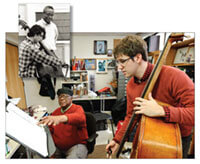
Above, Davis spends one-on-one time in 2011 coaching Ben Ferris, a music education major, just as he did with a student in 1993 (inset). Davis has recorded numerous albums (see above) and played with musical greats including Barbra Streisand and Bruce Springsteen.
Atypical Academic
“There are no typical classes [with Davis]. You never know what is going to happen,” says Ben Ferris x’13, a music education major who plays in the symphony, chamber, and jazz orchestras. He is part of Davis’s black music class, a member of the Davis-led Black Music Ensemble, and a bass student with Davis.
Ferris is well acquainted with Davis’s teaching rhythms and, as someone learning how to teach music, he’s getting a good background in what works. “Professor Davis has the ideal performance-based music classes,” he says. “We work with each other and share ideas together.”
During Ferris’s private lesson, Davis gives feedback, instructions, and encouragement. “A little more nourishment on that passage and you’ve got it. Don’t bounce the bow. Take long strokes from the middle of the bow. Show me how you are fingering that,” he says.
He sings a passage he wants Ferris to try playing a different way. The slurs and emphasized notes aren’t quite right to Davis’s ear. “Try it again,” Davis urges. “Get it down, and you’ll fall in love with yourself all over again. You are pulling something down out of the universe.”
Ferris is aware of the depth of the instruction Davis offers and is taking full advantage of their time together. “If you just do what you need to do to get by, you won’t get the full benefit of his knowledge and experience. If he sees you’ve put in the work, he adds to it,” says Ferris. “All his students are his priority, and he’s never not had time for me.”
Some of his best students, Davis recalls, couldn’t play much of anything at first. “Attitude and desire are the important things. They pick it up in no time. I’m never wrong,” he says.
Davis says he models his teaching style and commitment to students on Walter Dyett, his high school music teacher. Dyett saw something in Davis, and he nurtured and encouraged the shy teenager who loved music to attend Chicago’s VanderCook College of Music. He invited his students to his house on Saturdays. Dinah Washington, Nat King Cole, and others also benefited from the Dyett approach.
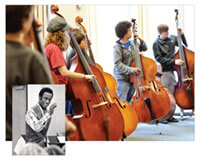
Nurturing budding musicians has been a steady theme throughout Davis’s career, whether doing so in his 1977 UW classroom (inset) or working with young bassists in 2011 (above) during a weekend of workshops and recitals made possible by a foundation he established in 1993.
Young Bassists
Davis also honors Dyett’s values by nurturing players ages three to eighteen through the Richard Davis Foundation for Young Bassists, Inc. Each year since 1993, students from the Midwest and beyond have come to Madison to work with bass clinicians, performers, and teachers, many of whom are Davis’s colleagues or former students.
The weekend of workshops, classes, and recitals provides intensive training and the chance to perform for and network with other bass players. Under Davis’s watch and nurturing, these young musicians will become the leaders others will one day follow. Some former conference attendees — now faculty members at other universities — return each year to help.
Ferris has already begun his Dyett legacy: at the 2011 conference, he helped lead a boot camp for high school students considering a career in music. He knows exactly how those young musicians feel, having played for Davis at the conference as an eighth grader. “It scared me to death,” Ferris says. “I had to play solos, and I wasn’t used to it — but it was good for me.”
Racial Healing
The impact of racial injustice is a common topic in Davis’s music history and performance classes. He considers racism a disease that is internalized, institutionalized, and infectious — but not invincible. Ever the teacher, Davis confronts it wherever he finds it, having seen too often what it can do. He challenges narrow-mindedness by calling it out and asking uncomfortable questions that make people squirm. His goal is to heal humanity of the disease and build “the oneness of humankind,” he says. That’s a tall order, but Davis won’t accept anything less.
On campus, he has worked with the Retention Action Project, a program that looks at the campus’ slow progress in enrolling, keeping, and graduating students of color; and Students for the Oneness of Humankind, an organization that evolved from a First-Year Interest Group led by Davis and colleagues Sabine Moedersheim and Lydia Zepeda. He’s been a diversity liaison, a house fellow, and a board member for Pathways to Excellence; he served on the Campus Climate Committee; and he was co-adviser for a campus group named PREA (Promoting Racial and Ethnic Awareness.)
Davis also started an awareness and education program for teachers called ELAT (Everybody Listens and Talks) and the Madison chapter of the Institute for the Healing of Racism. Both organizations work to combat racial conditioning through readings, talking, videos, guest speakers, and self-reflection.
Dale Burke, a now-retired UW police captain, says his eyes were opened when he participated in the institute’s program. “I only hope that I can somehow change who I am in my remaining lifetime, and pass on to my children what little I now know, so they do not have to wait forty-six years to finally learn the meaning of racism,” he says.
“If you don’t change attitudes, what are you going to tell your children? You have to make people feel accountable,” says Davis.
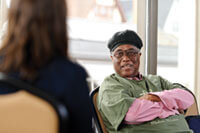
“I teach character. That’s the most important thing for me — follow-through and hard work. The world is not waiting on you, and there’s tons of talent out there.”
Changing attitudes can be discouraging work, but Davis prefers to focus on what can be done, rather than dwell on what hasn’t been accomplished. “That’s wasted energy,” he says. “I’m an action guy, and I have faith that things can change because I am working on it. I have a lot of strength and I speak my mind. I’ll talk about it as long as there’s an audience.”
Perhaps that perseverance comes from being a musician. You don’t rise to the top of your musical field without years of practice. And sometimes unlearning a bad behavior or technique picked up along the way can take years to correct — something that Davis has observed over and over in his music students, and in life.
A list of awards, honors, and recognition that Davis keeps for his work as an educator, musician, and advocate includes an unexpected entry: the day in 2000 when he received his first race-motivated hate mail from a student. It’s on the list of accolades, he says, because to him it meant that he was in good company — he was among others who have been attacked for speaking out and trying to make the world more just and humane for all.
“I teach character,” he says. “That’s the most important thing for me — follow-through and hard work. The world is not waiting on you, and there’s tons of talent out there.
“Good teachers teach you how to do what you do, and then better. If you haven’t become better than me, I haven’t taught you too well.”
Gwen Evans ’79 is a senior university relations specialist for University Communications.
Published in the Fall 2011 issue
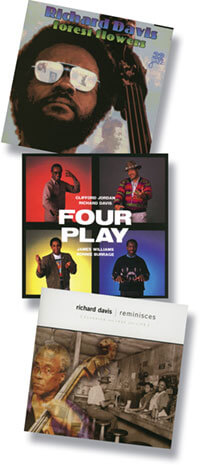

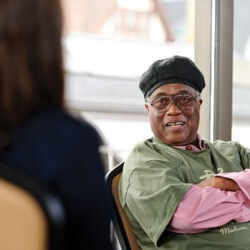
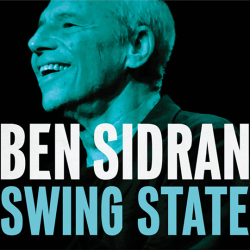
Comments
Pence Revington September 17, 2011
Oh yes. Thank you Gwen for this article. Great reminders of what it means to be a teacher; a teacher of anything. Richard challenged me to learn about myself by giving me a blindfold to wear while riding his huge athletic horse during a riding lesson. I still assign myself that lesson from time to time. Your article reminds me.
Steve Carmichael October 17, 2011
Wisconsin students are so fortunate to have someone with such an ethic and true wisdom to learn from! Richard Davis is a national treasure that we all can admire. Not just for the beauty he bestows, but for the ugliness he exposes so we can make a choice for beauty.
I would love to have had a teacher like Professor (mentor)Davis.
with the utmost respect,
Steve Carmichael
Director of Jazz Studies
Carthage College, Kenosha, WI
pat klobas November 14, 2011
Hi Richard
Great article. I loved working with you at Golden Gate Bass Camp.
Sharing lunch and dinner was always enlightening and fun! I’m happy to hear you are well and doin’ what you do. Thanks for your support over the years.
your Oakland friend
cousin pat
Martin Sheridan November 15, 2011
Richard. Let the healing and the music continue.
God Bless.
steven palmore November 24, 2011
Kudos Mr.Davis,your’s are the words of a saint.Most of America stills lives in denial, even in the year 2011.Denial to me means not being a part of the soultion to the problem.Race is still the biggest problem in this country ,though it is hidden and more often that than not either ignored, or not mentioned,both are just many of the forms of denial.Only by grabbing the bull by the horns and making an attempt to chaning he problem will real healing occur,and America is by and large SICK!
Brooks Robinson September 15, 2023
Prof. Davis was a man who knew no limits when the word “help” was uttered.